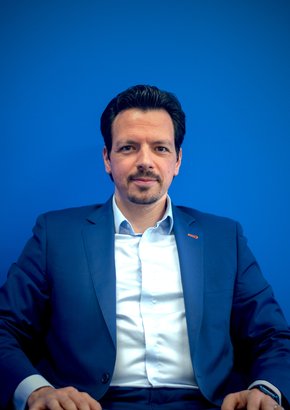
Wayne Butterfield
Global Head of Intelligent Automation Solutions
Founded in 2006, Information Services Group (ISG) has established itself as a global leader in technological research and advice. With a staff of over 1,300 experts working in 20 offices spread around the world, the company distinguishes itself with an innovative approach based on industry insight, cutting-edge analysis and hands-on experience. ISG’s diverse range of 700 customers is a testament to the breadth of its knowledge - from privately-owned corporations to public institutions and tech providers, ISG has been able to foster positive results and take its clients to a new level of operational excellence.
Wayne Butterfield, Global Head of Intelligent Automation Solutions, reflects that the company’s focus made a big impression on him when he started there in 2016: “I joined ISG for the people, the strategic direction that they were interested in moving towards and because the automation space is of real interest to me.” Having previously worked for two of the top tech/telecoms companies in the sector - O2 and BT - Butterfield explains that the fantastic opportunities and experiences that were afforded to him early on have gone on to influence his work with ISG. Learning various aspects of the industry, including online chat/chatbots, customer services, RPA (robotic process automation) and more, crystallised his experience and formed him into the tech advocate he is today. “It opened my eyes up to the role that technology can play in helping businesses achieve their goals, create business value and increase operational efficiencies.”
Although it’s a valuable insight, it’s far from a unique one, which is why, Butterfield continues, ISG Automation strives to differentiate itself from the competition by harkening back to its roots as a sourcing company. “ISG has the leading market share in all advised Sourcing deals globally. As a result, it has collated a significant amount of really useful data; it's a very data driven business now.” The importance of data in an era where information is gold dust cannot be overstated. Moreover, ISG’s recognition of automation’s value and its staff of ex-practitioners and early adopters means that clients can be assured of its credentials as an innovator almost immediately. “ISG is led by people, like myself, who didn't learn about automation from a PowerPoint,” Butterfield states, “as a really early adopter, I wrote the PowerPoint.” When he started working with RPA 10 years ago, Butterfield says that he was amongst the first globally to explore its potential. His work resulted in ISG’s concept of the ‘RPA Centre of Excellence’ based on five key principles: defining team roles, establishing an RPA CoE Council, establishing effective governance, managing organisational change and collaborating with IT. It’s a cogent level of expertise that few other companies can lay claim to. In fact, when asked what he considers the greatest achievement of ISG to date, Butterfield proudly says that the “long-standing repeat business [ISG] gets from multiple clients” is at the top of his list.
“RPA is a cornerstone of most organisations’ automation strategies at the moment,” says Butterfield. “It's generally the technology that most people have started with and I would say that it's probably the most mature at the moment.” Governed by software which emulates how humans manipulate digital systems, RPA can be revolutionary for a company seeking to emancipate its workforce of mundane, repetitive functions so that they can focus on more qualitative tasks. The potential for RPA’s application makes it a diverse subject and one which requires ISG’s level of knowledge to properly leverage. “The way we help our clients is based around discussing our experiences and then using the methodologies that we've developed to help accelerate their journeys,” Butterfield explains. “Having the right conversations, from a change management perspective, are what will make a programme successful, not whether you build a small number of bots; this isn’t really a technology play, but that seems to get lost in most marketing messages I read online.”
ISG’s sophisticated understanding of RPA is impressive. However, given the mercurial nature of the tech industry, the company had to push beyond traditional RPA and also consider other developments in AI (artificial intelligence) based automation. After all, in a sector where innovation is a key component, staying ahead of industry trends is essential. “We're living in a world where what is seen as state-of-the-art today could be disrupted tomorrow,” Butterfield explains. “Being two or three steps in front of your clients is really important. There's definitely been a mindset change throughout the organisation that we’re no longer just an RPA practice; we're an automation practice and we need to make use of different technologies.” Therefore, ISG started engaging in next generation technologies like NLP (natural language processing), OCR (optical character recognition), Virtual Agents and chatbots all the way back in 2017. Whilst RPA enables automation of the ‘hand work’, these other technologies represent a step forwards in achieving the same thing for much more complicated ‘head work’. ISG’s recent ‘Bot 3.0’ study surveyed 321 QTP (qualified to participate) companies found that only 7% of companies with a dedicated automation strategy included complex cognitive tasks, meaning there is still plenty of room for development in this field.
RPA has delivered a large number of benefits to organisations who have implemented it correctly, but it is not a panacea for all areas of business. Butterfield notes the Contact Centre as one further example of an automation area of interest: conversational AI continues to improve, meaning only the longer or more complex conversations will still require agents to handle them. “Unfortunately for agents, they still have the pressure of an average handling time (AHT) target on the residual contacts,” he states. “It will then be Assisted Automation (vs RPA) that will further enable swifter contact resolution: quickly retrieving customer data and presenting it to the advisor within seconds, ensuring compliance scripts are read whilst completing arduous manual tasks in the background and even adding notes for completed actions.” Butterfield posits that this kind of automation for advisors will be imperative for more complex enquiries, effectively utilising the best of both human and machine intelligence in a way which delivers optimal customer outcomes. This use of multiple technologies, rather than a ‘silver bullet’ is where we are seeing increased traction in the market.
It could be argued that the need for ever-increasing levels of automation has never been made clearer than by the socio-economic effects of the COVID-19 pandemic. Whereas previously a company could substitute human workforces with relative ease, the truly global impact of COVID-19 has highlighted for many enterprises the necessity of maintaining a good human-robot mix to ensure business continuity. “I think from an automation perspective, it has really heightened the need for the (nonhuman) digital workforce to be a core part of just about every organisation’s strategy moving forward,” states Butterfield. The other effects of the pandemic on ISG in particular have been maintaining compliance and regulation within a new paradigm of remote working. “It’s extremely difficult to manage when you've got 2,000 agents working from 2,000 separate locations, predominantly from their home, and that's not to even start thinking about the bandwidth challenges and the connectivity issues,” he continues.
As a team of problem solvers, ISG has achieved commendably. Having said that, since technology never stops changing, problems needing to be solved won't either and so the company’s focus must always be on the future. Despite the increasing sophistication of automation, Butterfield is confident that ISG Automation’s reputation and expertise will guide it successfully. “Understanding the nuances between the various different technologies has always been an area which ISG really excels in,” he states. “We understand the complex and are able to explain it in simple terms. That’s what really resonates with our clients: who wants to be baffled by technology?” For the rest of 2020 and beyond, ISG will be focusing on helping its clients progress to a new generation of automation and promoting the seamless, sustainable benefits it can bestow. “The spectrum of automation technologies available, I think, is very important,” Butterfield concludes. “There is no one solution which is the panacea for automating large chunks of a business. Making sure that you're choosing a trusted advisor will be extremely crucial and ISG is the right partner to guide that journey.”

- Top 10 Robotic Process Automation companies in the worldAI & Machine Learning
- Augmenting human intelligence with RDADigital Transformation
- Laiye closes US$160mn Series C to fund automation expansionAI & Machine Learning
- Sabio unveils AI-powered customer experience (CX) platformDigital Transformation
Featured Interviews
We’ve built some unique features into our insurance program specifically because we’ve listened to courier partners in every country





